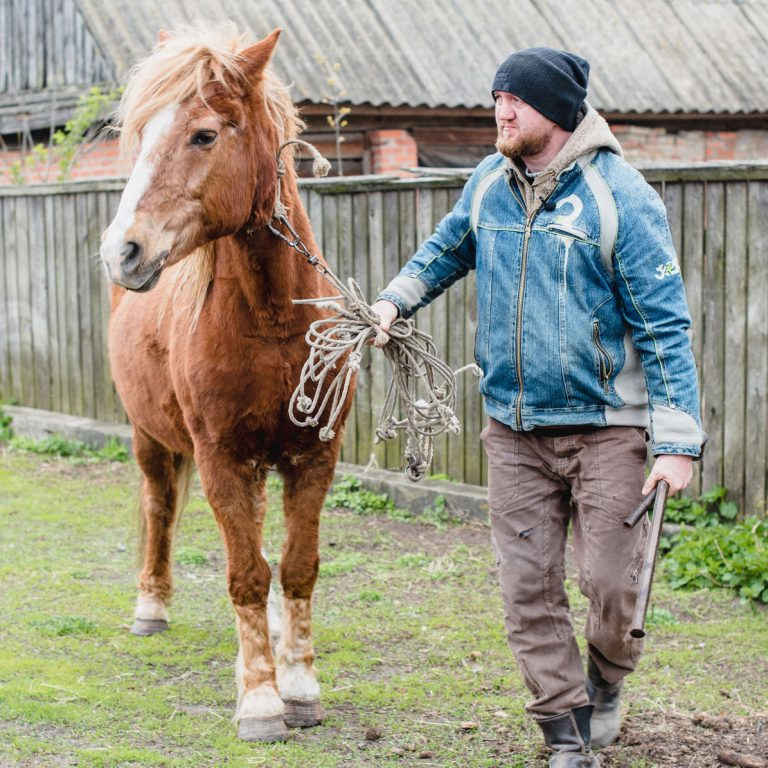Prybirsk in Polissia could be just a picturesque village not far from Chornobyl. It could be known only by locals and some very curious tourists, but thanks to a couple of indifferent activists the village got re-energized. The festival “Chornobyl-Renaissance” was held there twice, the school and community center got repaired, and the tourist infrastructure is being developed. Willingness of one person to change things was taken up by others for the sake of a common goal.
Yurii Molfar (real surname Yagusevych – ed.) moved here from Podillia in 2008 and decided not just to live in a new place but to change it and the people around him. At some point, Yurii travelled around the Carpathians a lot in search of a folk magician, aka molfar. That’s how he got his nickname Molfar.
At first he was like everyone else: ran homestead, was busy with construction and lived a regular village life. He told us that he still misses his native region:
— I originate from Vinnytsia region. There are black soils, leafy forests, not conifers. There are hills. I picked this place because there was a hill. So I live next to the hill, like at home. The nature is completely different here. Though fauna is more various, “agroelves” ploughed everything back home and here you have more of wilderness.
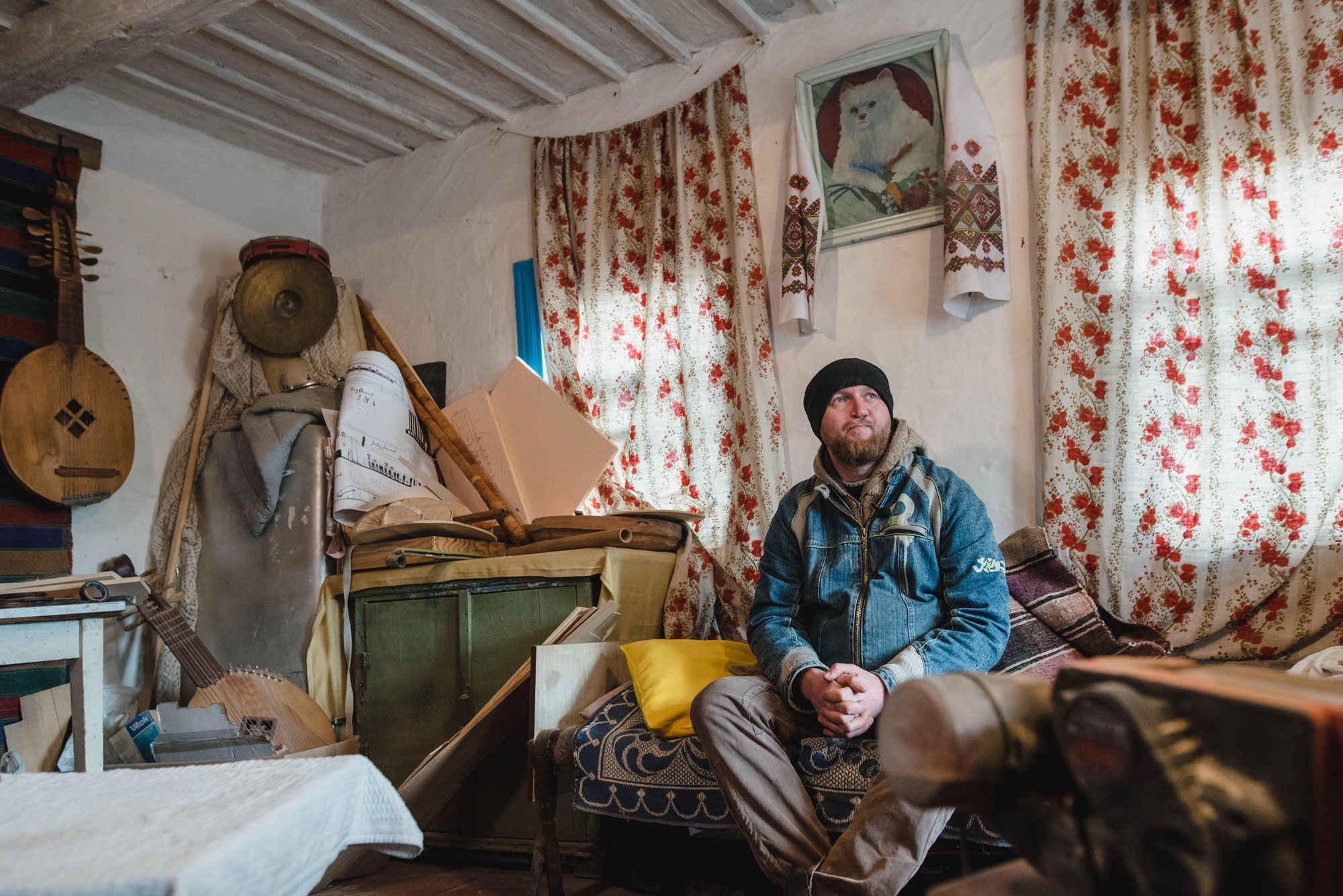
Yurii was born in Murovani Kurilivtsi. At first, he got a law degree in Vinnytsia and then continued the studies in Kyiv. Then he was selling beer on Maidan Nezalezhnosti and decided to become a designer:
— I worked as a designer, then got sick and tired of everything and came here. I was looking for a house. I came here in spring: it was so beautiful here with a meadow and waterfalls. To cut long story short, it was magnificent. That was it – I decided I would live here. It was pricey though. A house in this condition was eight thousand dollars. Now it’s cheaper because of a crisis.
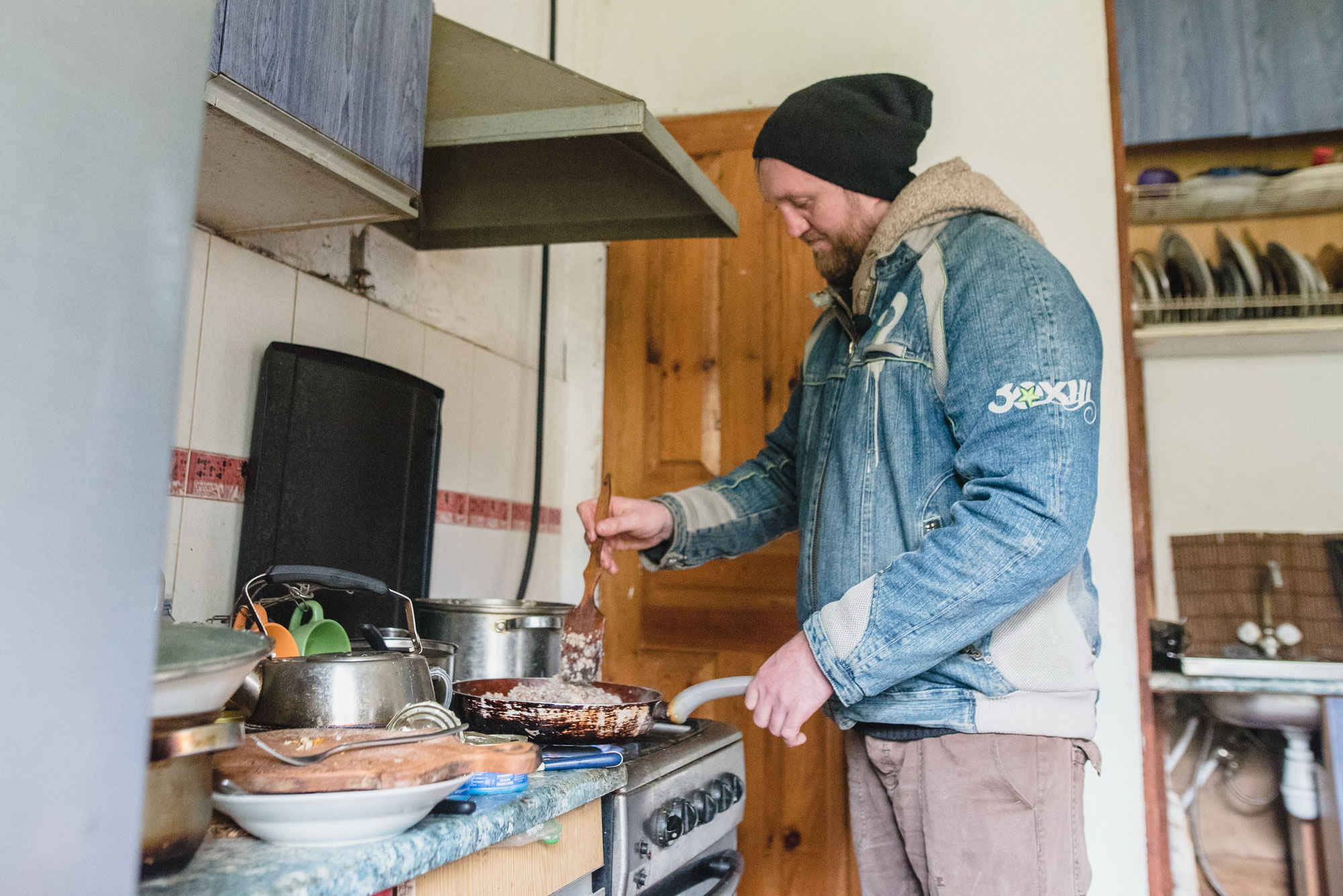
Nowadays Yurii makes musical instruments and logboats. He also plans to organize horse riding and dreams to create a scansen in Prybirsk – a museum of national architecture featuring houses with reconstructed household from previous centuries. He has even found a two-hectare patch of land next to the river:
— There are preliminary agreements. I have to give a call and go meet with scientists so that to know how much all of it would cost. In May, we will start building a museum and a permanent exhibition, and gradually we will move forward. This type of project can’t be done in a year or two. The scansen will be private so that no minister could close it down.
On the overall, Yurii joined the organization of three projects in Prybirsk: a festival, a scansen and a sanctuary. The festival was a life changing step for the village.
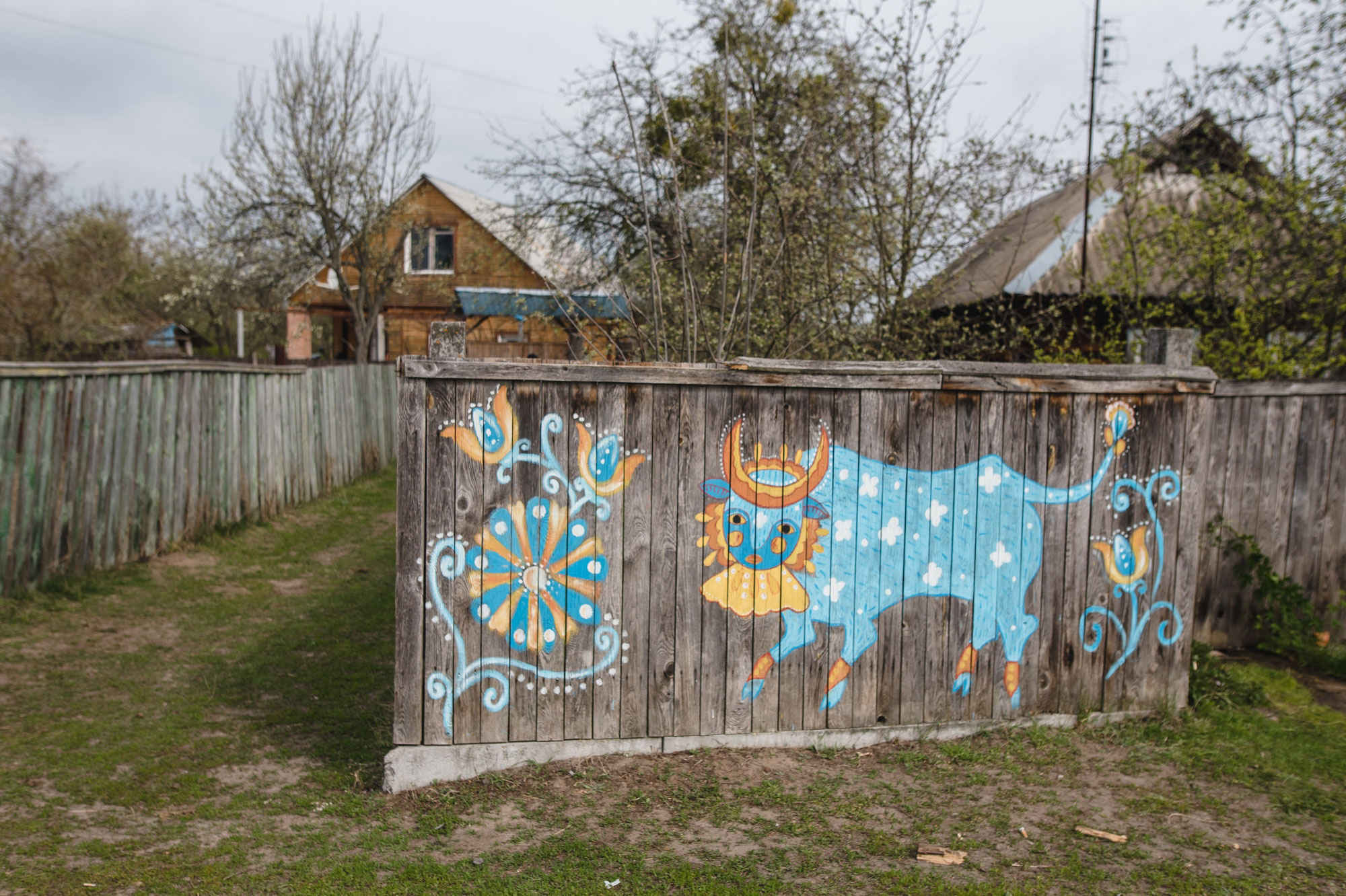
Festival
An idea to create a festival came to Yurii spontaneously in a moment of crisis. When Yurii learned that local meadow was supposed to be leased, he decided to organize some public event in order to prevent the lease. The vastness of the meadow was one of the reasons why Molfar picked this place for settling down.
— Back then we were going with Hlukhenkyi (Dmytro Hlukhenkyi – ed.) — he is a documentarian. We were shooting a criminal movie and were coming back through Obyrok. So he asked me to accompany him because he was invited to a public movie screening. There was also Lionia (Leonid Kanter, the founder of an art hamlet Obyrok) and he suggested to organize a festival. I had this idea long ago – to hold an event that would make a lot of noise so that the meadow would not be leased. We came to an agreement. I said, “Lionia, I do not know how to organize festivals, but you do. I know how to build. I can build something for you and you will make a festival for me.” So we built him a two-storied canteen, those ovens where they bake bread, and sheds over them.
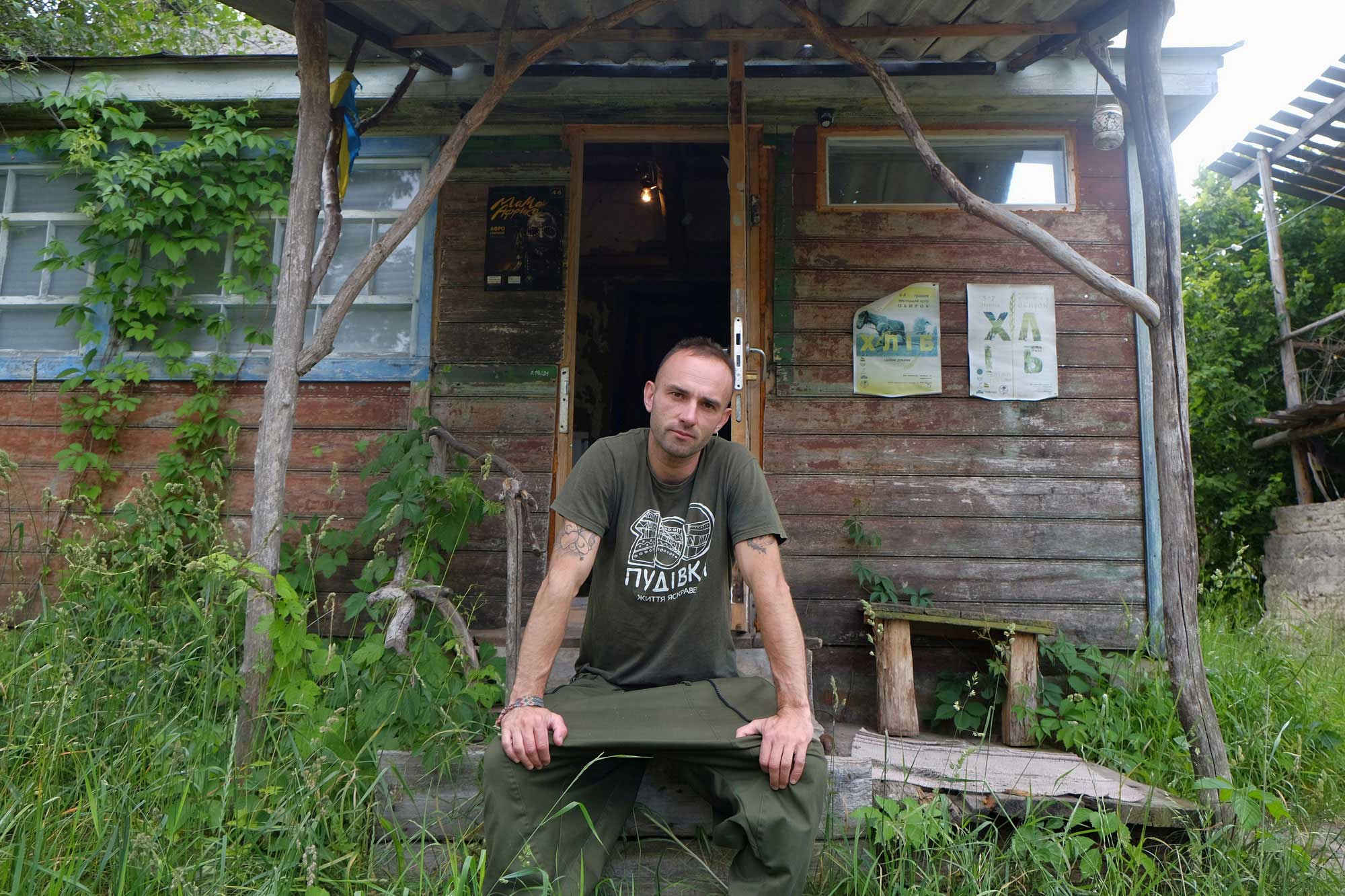
They made a hostel for festival out of deserted premises of a kindergarten. People volunteered to clean up the territory and take out garbage. In order to attract tourists and for own convenience, local people cleared out a place next to the river and made a beach:
— We go to Strakholissia that is 20 km away to have a swim while we have everything for it right here. So I suggested clearing it out and bringing some sand to make a beach. It had never occurred to people to do it on their own. Festival was an accelerator. People tend to do things to show off in front of others rather than do something for themselves. So young people with scythes joined their efforts and cleared everything out. And that was it – beauty everywhere.
In total 50 people showed up for a cleaning before the first festival in 2016. Yurii says that one month was very intensive since they had to get rid of some things, make benches and tables and put glass into kindergarten windows.
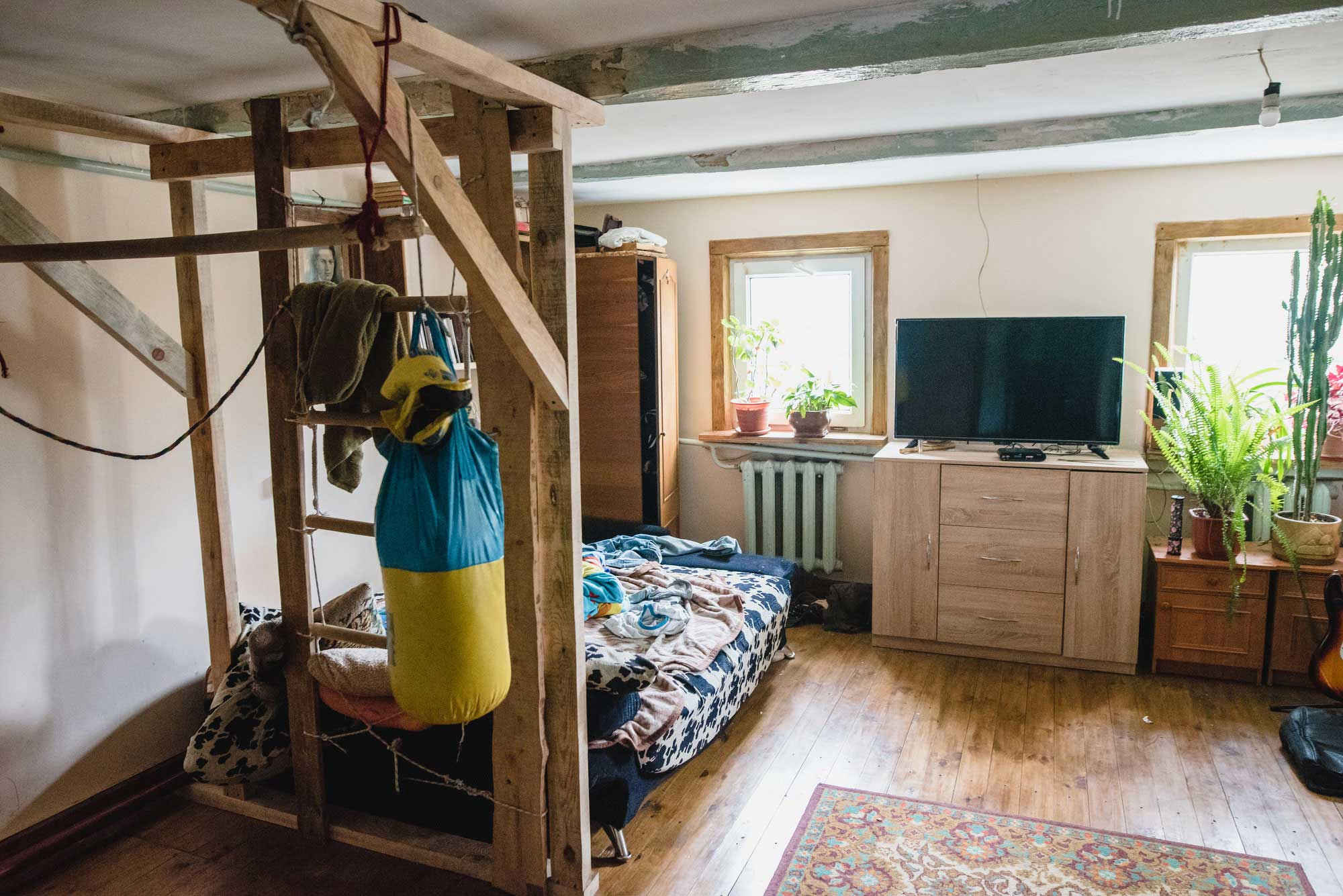
A local librarian, the head of the village administration, and a couple of deputies worked with Yurii on festival organization. The biggest support came from Maryna Beschastna, the head of the village administration:
— She used to be a lecturer in the university Ukraine (The National University of Life and Environmental Sciences of Ukraine – ed.), moved here and became a head of administration. She left her previous job. Now she is working on a thesis on green tourism (thesis on administration in rural area – ed.)
However, everything was organized by own efforts:
— We have spent tons of our own money on the festival, and a great deal of time, too.
According to Maryna Beschastna, local authorities joined in the festival organization. They helped with transportation for musicians; cut timber for making tables and benches; provided and built the stage; provided some sound equipment and sound operators.
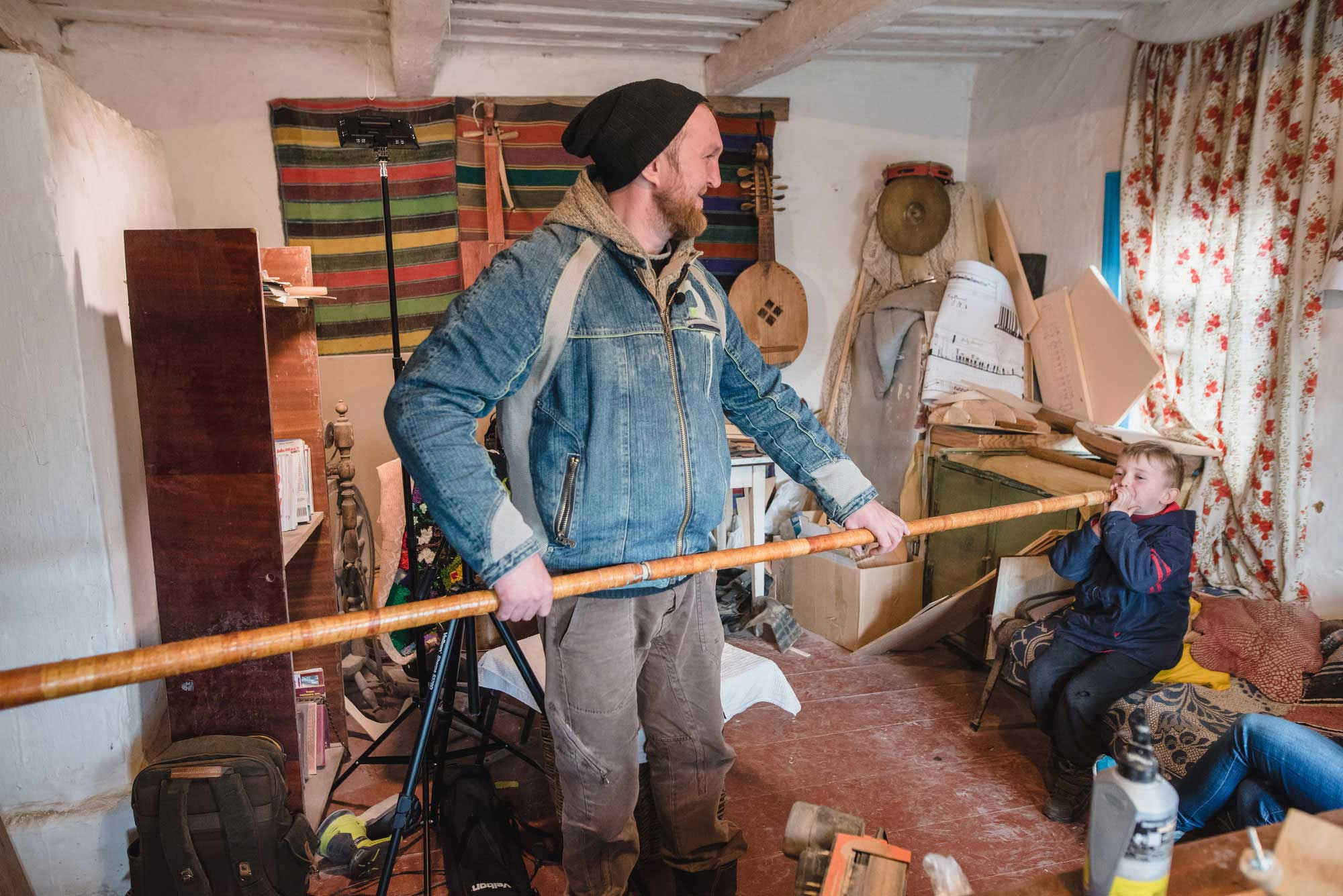
After the first festival, the village hit the mass media:
— I said, “Take a look, it came out to be an international festival: we have visitors from Belarus, Poland. Take a look at our community center – it’s in ruins. What if a piece of ceiling fell on Polish guy’s head, who would be responsible?
In general, the first festival organised by efforts of local people gathered around two thousand people. In 2017, an ancient rite “Farewell of a Mermaid” was recreated during “Chornobyl – Renaissance” in Prybirsk. During Mermaid week in Polissia, there were traditional spring farewell rites, namely the rite of mermaid farewell.
During both festivals, there were public documentary movies screenings, performances of Ukrainian and foreign bands.
Though both festivals were successful, this year Yurii has changed the name of the festival:
— The previous festivals were great despite the lack of experience in organization. We managed to hold a festival thanks to people who knew how to do it and helped us. I am talking about Leonid Kanter, Valerii Gladunets, Oleksii Nagorniuk, Natalka Leshchenko, Yurii Kovalchuk and many others. Some local people got interested in it too. I cannot say that all of them were involved, but we had an active core team. However, after holding two festivals, this team applied for state financing. I did not like this idea, that is why I took a decision to move to a private territory and to change the name of the festival in order not to be associated with state money. Now, having four hectares of land, it is possible to start organizing a scansen, horse riding and it’s reasonable to hold the festival there. Technically, it is much easier to do it on a private territory.
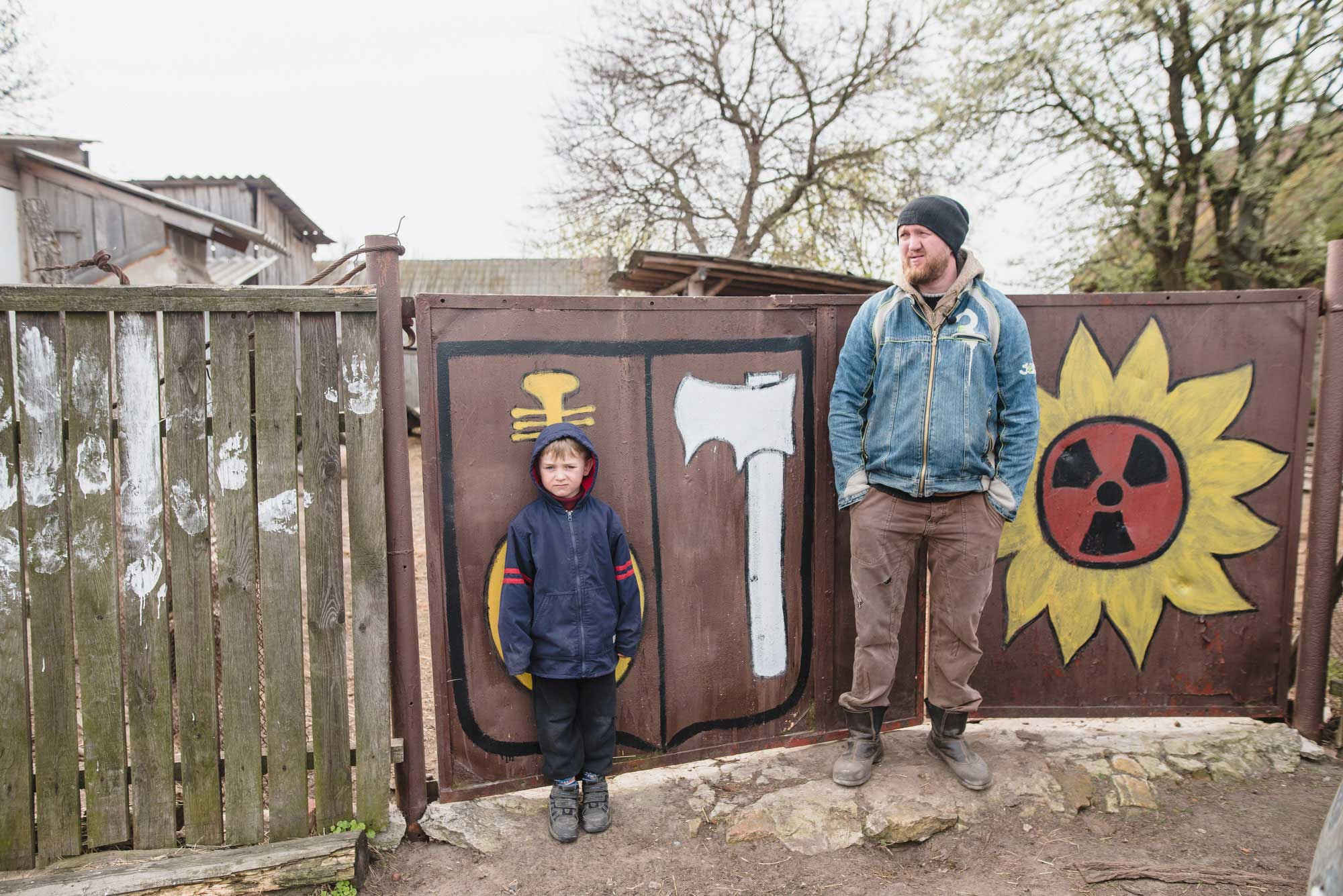
Territory of life
Yurii has his own workshop. He had had no idea about existence of the house where the workshop is now located: it was a small house, very old and overgrown with bushes.
— I thought it was only extremely thick bush. Then winter came, leaves fell down and I saw a house behind it. That was it, I bought it. Well, it was hard to find its owners. They did not have documents for it. It was a real quest. At first, I had to figure out who lived there. I found the owners in Kyiv or Boryspil. I gave them 500 dollars and told them to give the house to me. I asked them to write a quittance note for me so that I could start doing something in that house. That’s it.
Time has changed Prybirsk. Nowadays the houses are not located close to each other, which is quite unusual for this region:
— There are hamlets here, wood lines, forests. The houses were scattered all over the place. Right there was an agricultural plot where they ploughed the land. There were forests all around, swamps, and only one small highland. People were forced to demount their houses and put them here next to each other. Their land was taken away. Then Germans came and let them go back to their plots. So people demounted them again and carried them there. It was like lego bricks. Nowadays it is different. They say that 20 years ago there were 5 houses where my house now stands. I have one neighbor now, but there used to be 8 houses. That was a real pile. They were herded together. One elderly man used to say that they did it so that the master could easier coerce everyone to villein-socage, not to go too far.
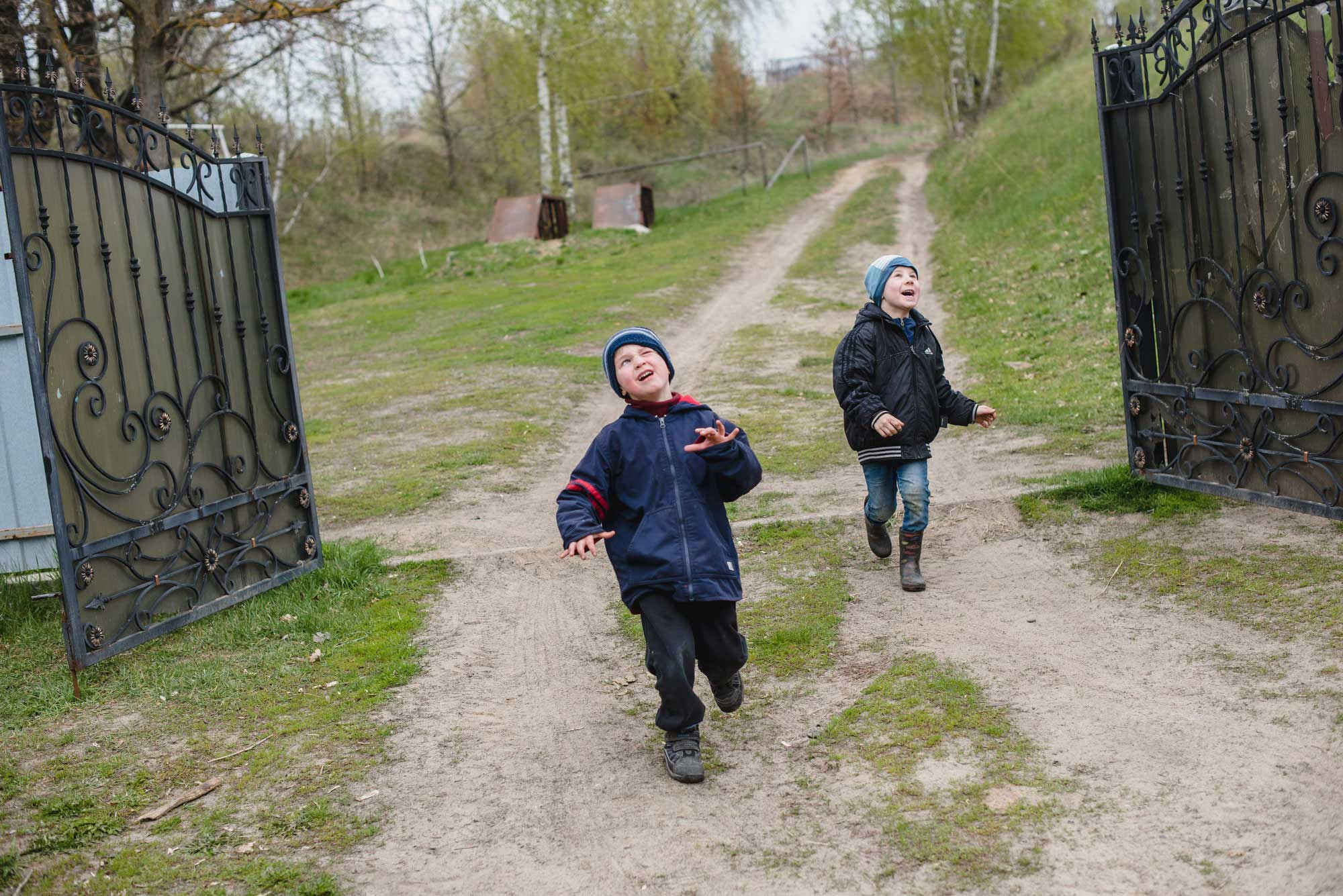
Molfar is saying that there are not many Polishchuks (Polishchuk is a Ukrainian-language toponymic surname associated with Polissia) left in the village. Earlier there was a Kyiv-Chornobyl highway, and at some point population mix changed a lot.
— The highway went through the village across the meadow. That’s why there is a mix of population. Then there was Chornobyl disaster; many people fled, many liquidators came. So the local ethnos is not preserved at all. An average Polishchuk is 170 cm tall, whereas an average height for female is150 cm, and it’s very hard to find people with such measurements nowadays. There are few of them.
There are many wild animals in Prybirsk: elks roam kitchen gardens and eat anything green, foxes run around; there are beavers, wolves and lynxes:
— Fauna is just like in the exclusion zone. Animals do not understand that there is barb wire and you are not supposed to enter. They just go wherever they want. I had encounters with elks last year: I was riding a horse and they were looking at me like I was an idiot. I was looking at them too: I did not know what might cross their minds. So we all went different ways. Also, you can scare off deer. Beautiful! Foxes are also cool: sometimes they are big and beautiful. Beavers. Beavers are very industrious. They put down all the trees and made an empty lot.
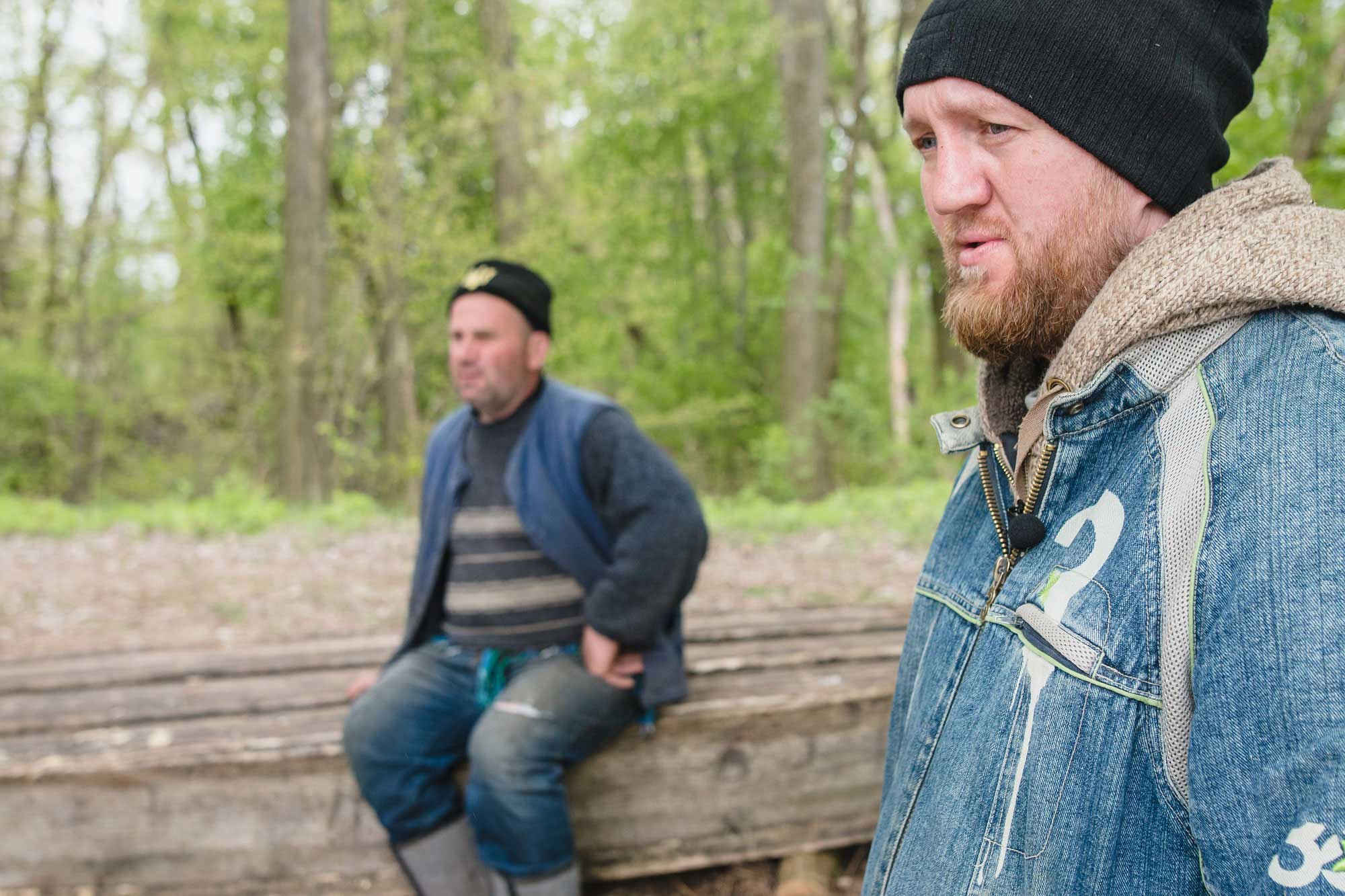
Relationships with neighbors are not something Yurii is good at. He does not try to be like other local people, but he does not want to change all of them either. He says that he does not like their attitude to nature in general, since they litter everywhere and make mess:
— Why should I change everyone? You need to change adequate ones, those who do want to change, for example Serhii. People change anyways when you have a conversation with some of them. If they listen to you, they may change.
Yurii has common interests with Serhii: they are making logboats together. They say that they are planning to organize river drifting, and they are going to make more boats if it gets popular with tourists. Single seated boat can be made in three days. Now they are working on a four- seated boat:
— This is a device to sail. If you turn it wide-wise, it is going to be as wide as a car. We make not traditional logboats: with wave cutter, half Chaika (chaika was a wooden boat made of a single tree trunk about 18-20 metres long). Broadsides can be planked and it gets even bigger. Here there are workpieces and hooks. They are called transverse ribs in science terms. Bee trees, boats, logboats are all traditional for Polissia. I did not know the technology so I thought that you can just scoop it out and that’s it, but it turned out to be not so easy. First time it was tough. Firstly, you need to cut it down so that it does not fall, because it can crack. How do you make it fall? There are peculiarities. The log can fall and get cracked. When it does – that’s it, it cannot be used. How should you start scooping out? You need to make marking so that it will not keel over. And finally you can start working on it.
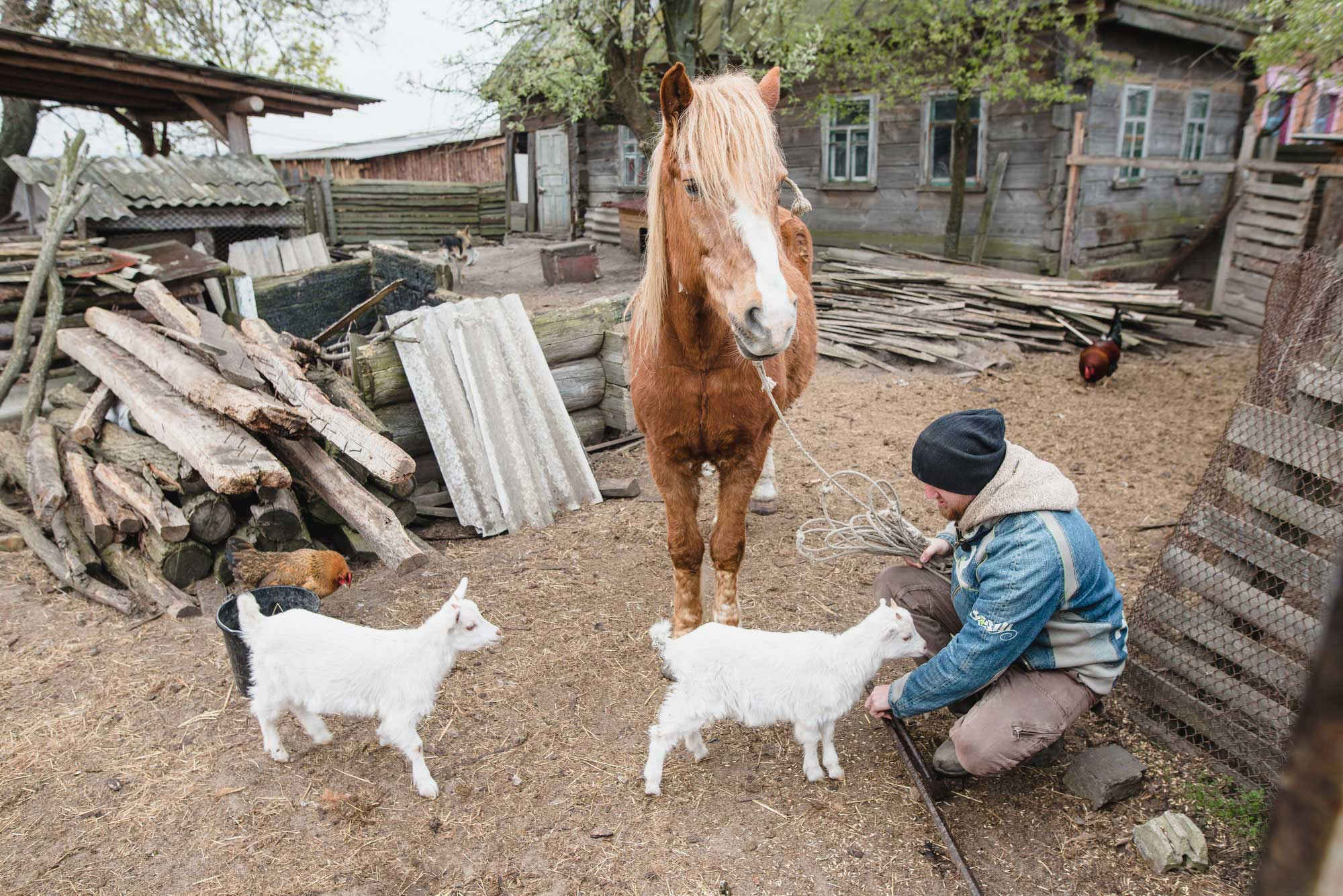
Yurii used to have 17 goats, 30 bee hives, about a hundred of chickens and a horse. Today, he has chickens and a horse. Flowers grow in the kitchen garden. He almost quit homestead because he believes that it is just a waste of time. There is no difference whether you grow food or buy it from neighbours:
— It’s all relic from the past. If someone wants potatoes, let them plant potatoes. But only potatoes. We usually have all at once – pigs, chickens, potatoes, this and that. So you just run in circles taking care of beets, pigs, potatoes and a cow. And then we have some other stuff. All of that takes the whole day. Then people ask, ”Why are we so poor, where is our money, why do we work so hard?” You can drag bricks from one pile onto another all day and then ask “Where is my money?” You need to think first what is profitable and what is not. Such way of thinking is the Soviet Union legacy.
Yurii was planning to sell his horse. So he decided to have a farewell ride. Now he has stables and plans to organize horse riding:
— I was riding through forest for two days. I liked it very much and decided that more people should see it – Chornobyl nature, elks, wolves. Now we are planning to start horse riding trips for a couple of days with full immersion experience. We are selecting horses at this point, and along with that we are trying to find and revive the Polissia horse breed. Almost nobody knows about it. This breed has almost disappeared, but you can still find those horses in some villages. So far we have hosted our friends and friends of our friends. We haven’t officially launched it yet.
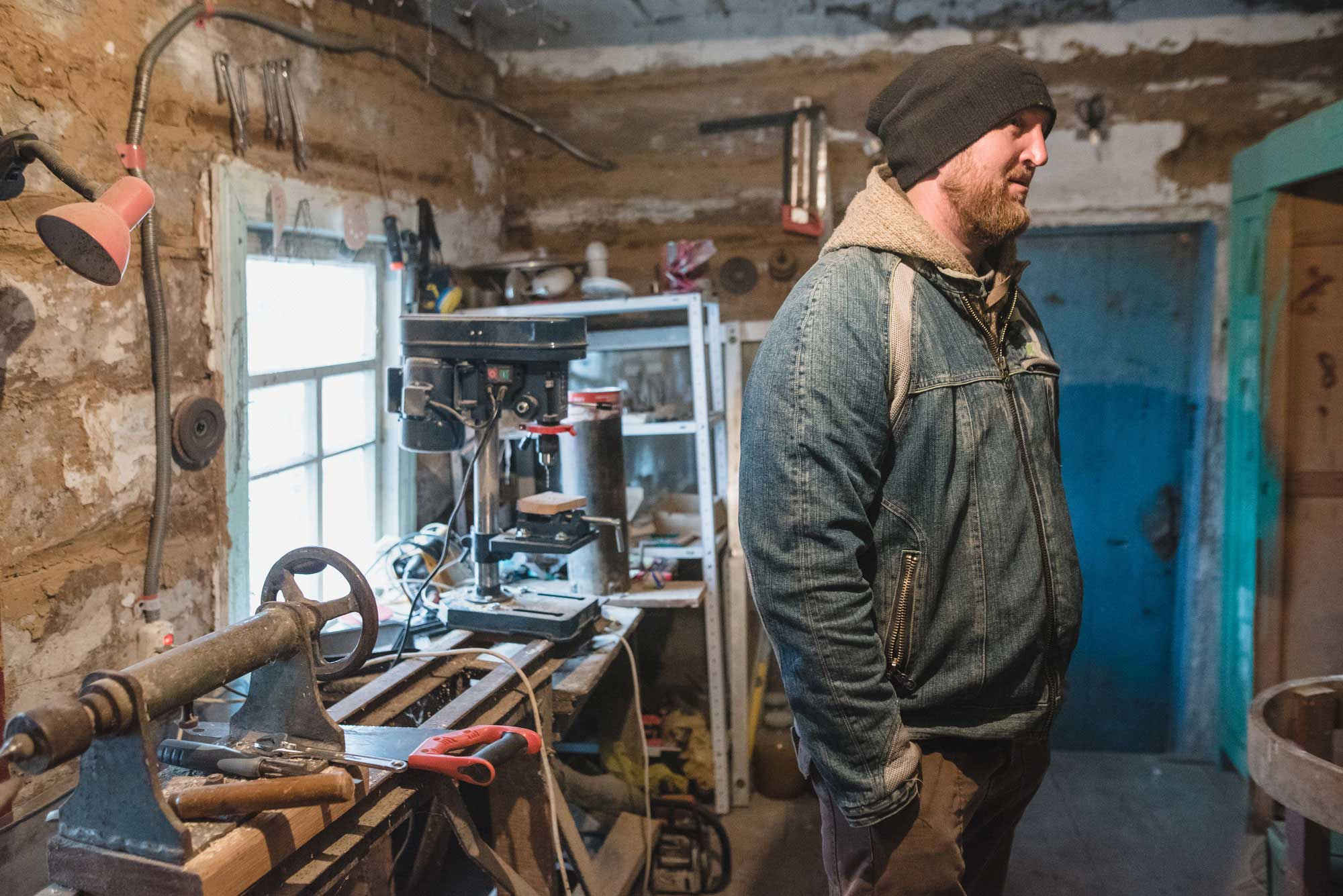
Мusical manufactory
Music plays a significant role in Yurii’s life. Without special education, he learned to play kobza (Ukrainian folk music instrument of the lute family), lyre, torban (a Ukrainian musical instrument that combines the features of the Baroque Lute with those of the psaltery), guitar, flute, piano, percussion. Yurii is a musical instruments craftsman. He makes hurdy-gurdies and kobza of his own design. He made his first lyre using photos, because he wanted to learn how to play it. Now he has his own blueprints and works according to them:
— I wanted a lyre, but I had no money. So I made it and they bought it at once. So I decided to make another one and they bought it again. So I still keep making them.
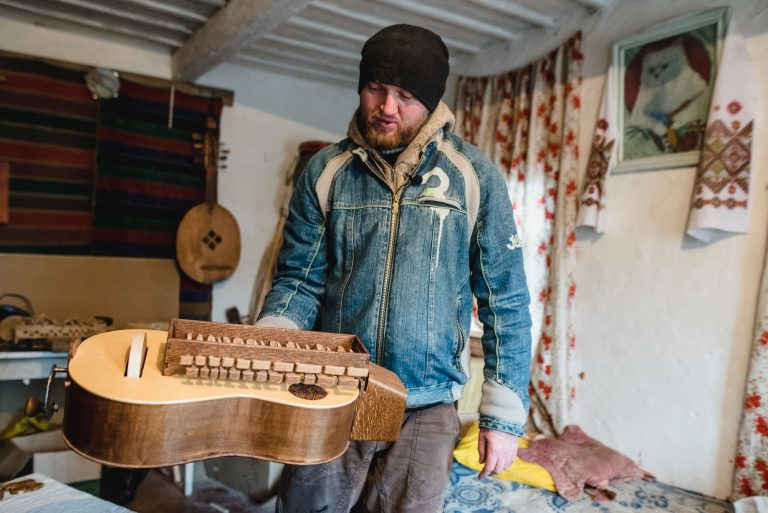
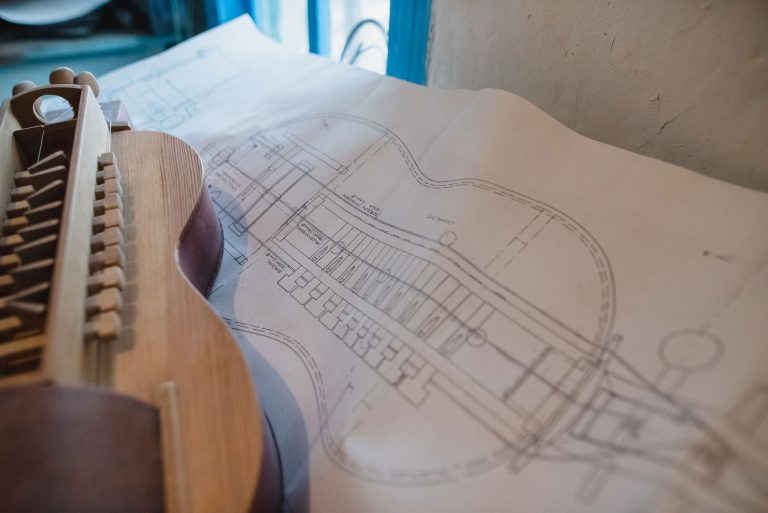
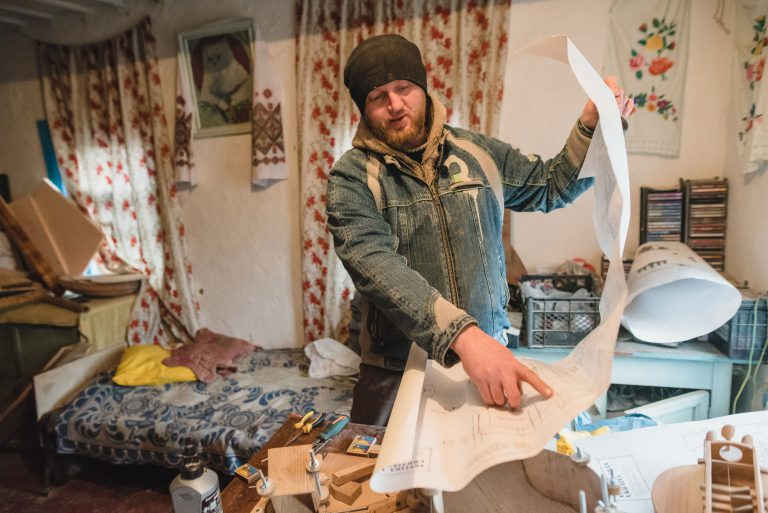
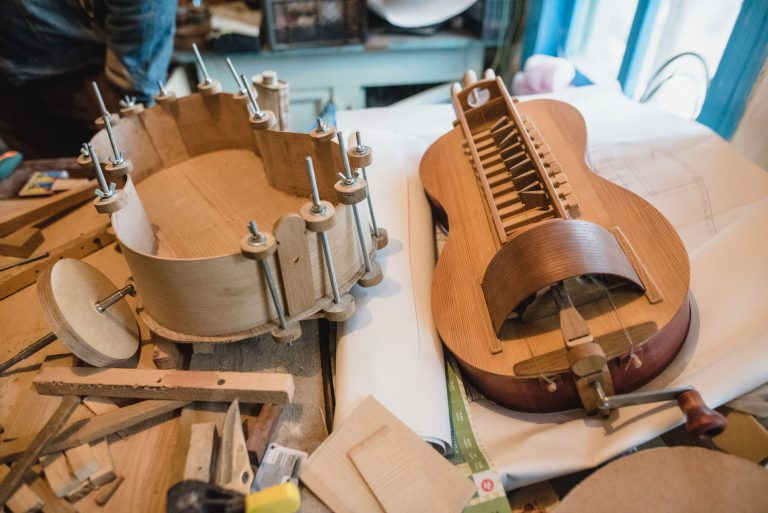
slideshow
Nowadays Yurii is making music instruments on a by-order basis. One instrument costs $250-300 on average. However, it is not very systematic work. So if he really needs money, he can make one lyre in 4 days or in 4 weeks if it’s not so urgent:
— I don’t like to make instruments. I simply don’t have money so I need to earn it somehow. I would play it but not make it. Maybe, at some point, once a year I would make something. But I must make the instruments out of necessity.
The craftsman has a couple of apprentices among local people. It is a certain kind of therapy for some of them, especially for those who returned from the East.
— This instrument was made by one of the local guys. I was showing and explaining him and he was making it. It does not play now, as the wheel has a defect. I need to replace it. I have an idea to create a psychological and rehabilitation center on the premises of the former hospital. People who are not happy about something in their lives could come there and have such relaxation while making a lyre. So one will turn the crank and will feel happy. It takes a week to teach somebody how to make a lyre.
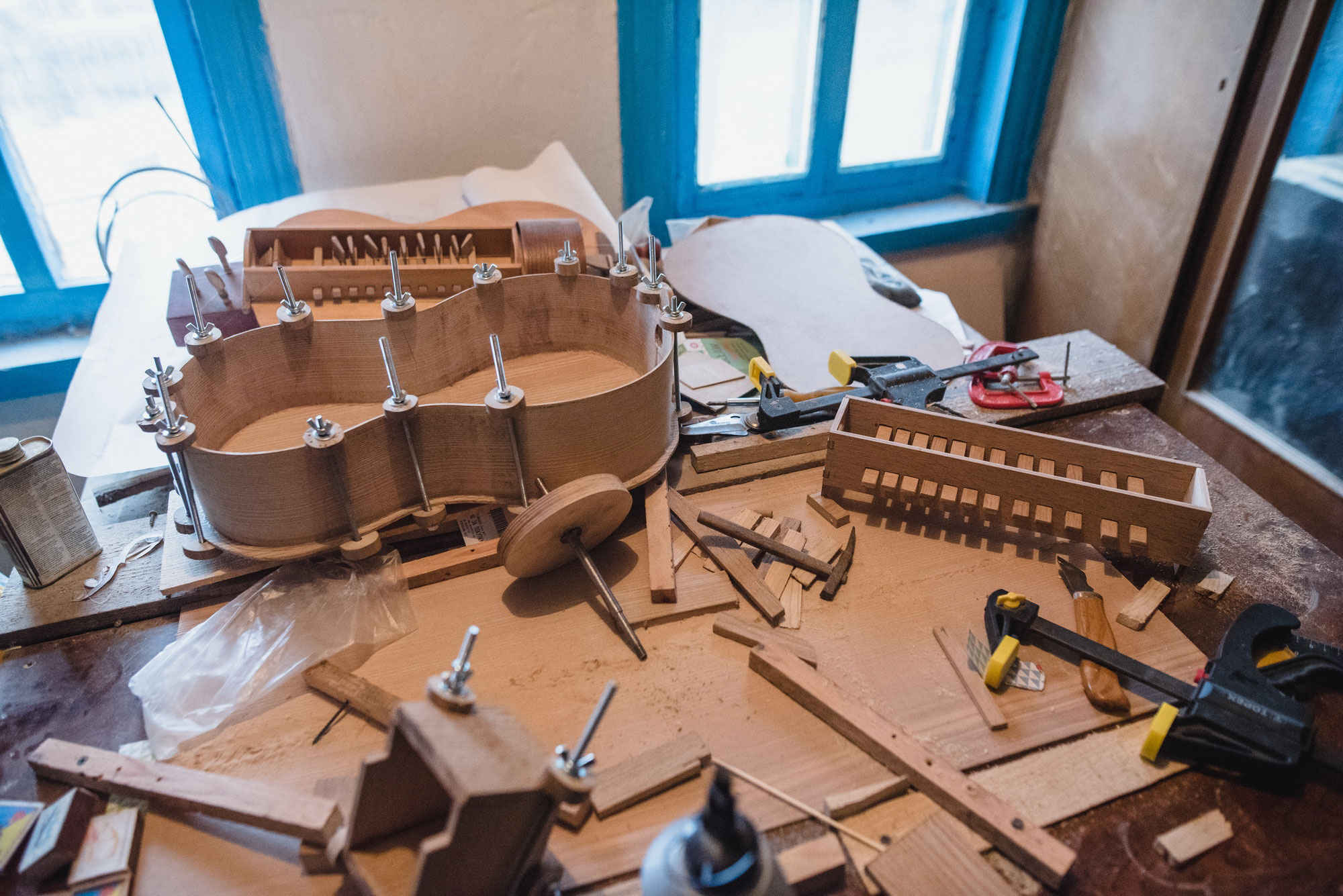
Sometimes you need to wait for good wood to make a lyre. Yurii used to think that any wood is good for an instrument. Now he works only with good materials:
— I have been making this one for a very long time. I had been waiting for this wood. I had everything ready to glue it together and give it away before the Easter. But I wrote the customers that I couldn’t send it because I was waiting for very good wood. So I asked them to wait. They agreed. That wood was really good. I hadn’t had this quality of wood before. You look at it and it is like plastic – the fibers. It was hard to believe that it was natural, so ideally it was crafted. It had also been dried for 20 or 30 years – really dry and seasoned wood. You see, both a piano and a lyre have similar elements and good sound depends on them.
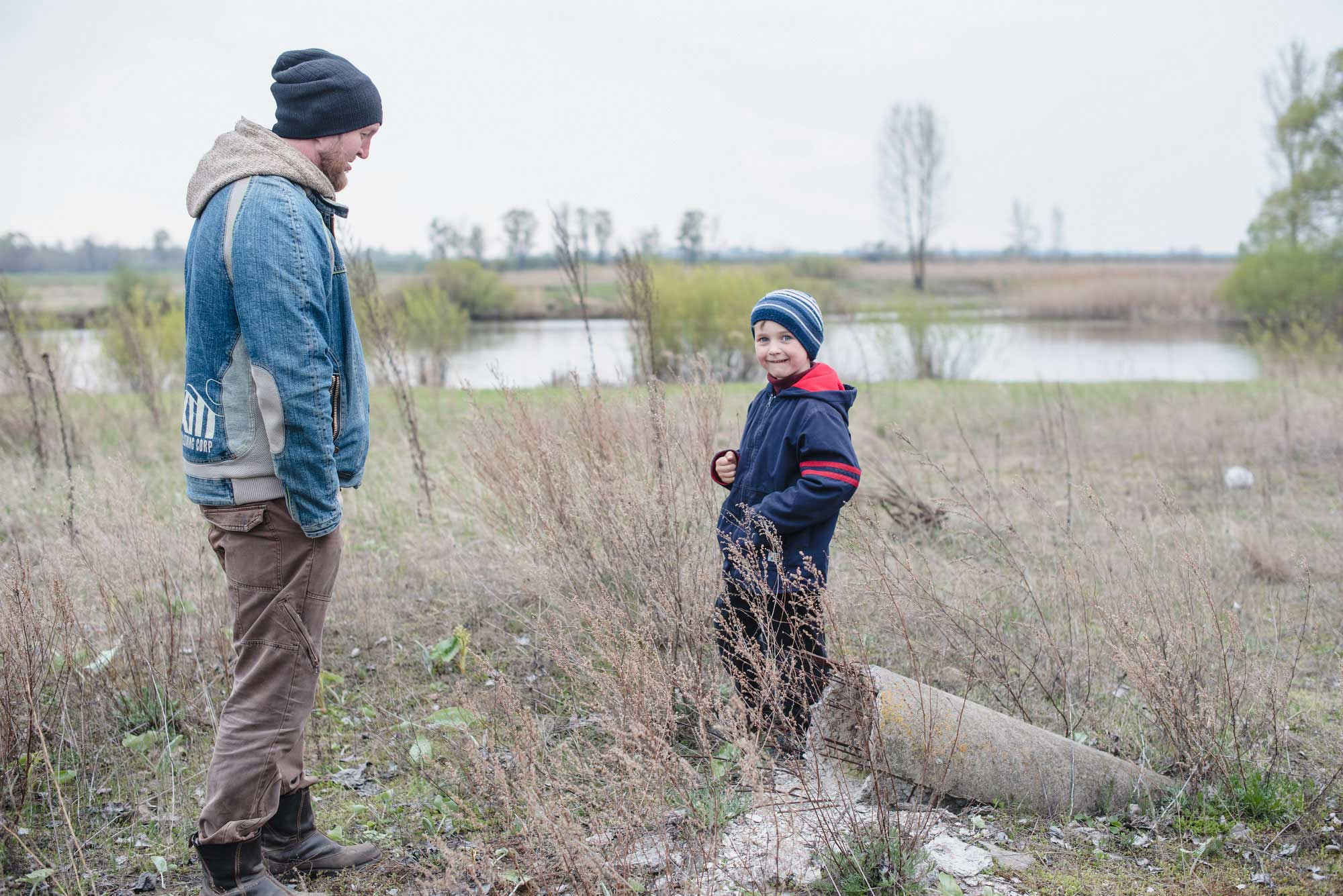
Yurii says that while plucked and bowed string instruments existed all over the world, lyre was considered to be exceptionally European instrument:
— The borders of Europe stretched as far as lyres were played. Russia did not have them. If there is no lyre, there is no Europe. Lyre was in Ukrainian villages, but not any further east. There were no mentions about it. Lyre is an indicator of Europe. There was no lyre in Africa or anywhere else.
There are many different tools and materials to make lyras in Yurii’s workshop. He shows us morin khuur (a traditional Mongolian bowed stringed instrument) made of firewood. He says that at some point he fancied it and made it. The strings are made of horsehair:
— Morin khuur originates from Mongolia. Morin means a horse and khuur means an instrument. It’s an ancestor of our violin. But the trick is that you do not press the strings. You see – there is no sound. So strings are not pressed against the fingerboard, the strings are far away from it. I made it out of horse tail and I play it.
Besides making national instruments, Yurii also plays them. He has his own band “Bramado” that performs mix of Ukrainian canticles, psalms and dumy (Ukrainian sung epic poems).
Yurii tries to change things around him gradually. Living in Prybirsk with his family, he rides horses, works a lot with wood and plays musical instruments. Village people start understanding that tourists get interested in that area. It means that the time of changes has come.
How We Shoot
This story is about the village of Prybirsk and the way to Yurii Molfar who is not actually a molfar. It is about the head of the administration who tries to implement some positive changes but is not always successful. It is about a walking GPS and hospitable Polissia. .

